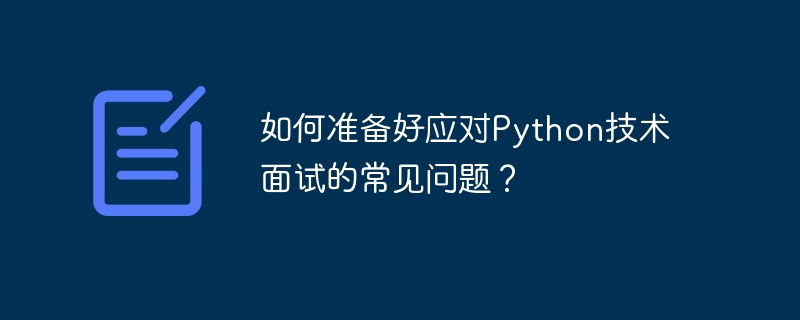Home >Backend Development >Python Tutorial >How to prepare for common Python technical interview questions?
How to prepare for common Python technical interview questions?
- 王林Original
- 2023-09-10 13:46:41886browse

How to prepare for common Python technical interview questions?
In today's highly competitive job market, technical interviews have become an important part of selecting talents. For popular technical fields, such as Python, technical interviews are becoming more and more difficult. In order to stand out in the interview, we need to be fully prepared in advance. This article will introduce some common Python technical interview questions and give some preparation suggestions to help readers better cope with the interview.
- Introduce the features and advantages of Python
This is a very common question. The interviewer wants to know how well you know Python. You can answer from the following aspects:
- Python is a dynamic, interpreted, object-oriented programming language.
- Concise and easy to read, with elegant syntax, it can improve development efficiency.
- Powerful standard library and third-party library ecosystem, providing rich functional support.
- Cross-platform, can run on different operating systems.
- Supports multiple programming paradigms, such as functional programming, object-oriented programming, etc.
- What is the GIL in Python? What's the impact?
GIL (Global Interpreter Lock) is a feature of the Python interpreter. It controls at the interpreter level the ability that only one thread can execute bytecode at a time. This means that in the case of multi-threading, Python's concurrency capabilities are limited.
The interviewer may ask about the impact of GIL on Python's concurrency performance. You can answer:
- GIL does not have much impact on the performance of CPU-intensive tasks, because in this case, multi-threading does not improve performance.
- For I/O-intensive tasks, the GIL will reduce Python's concurrency performance because other threads cannot execute while I/O is waiting.
- How to solve GIL problems in Python?
Although the GIL limits Python's concurrency performance, we still have some ways to bypass this limitation. You can mention the following points:
- Use multi-process instead of multi-thread: Multi-process in Python can bypass GIL restrictions because each process has its own interpreter process and each other There is no shared GIL between them.
- Use concurrency libraries: There are many concurrency libraries in Python, such as multiprocessing, asyncio, etc., that can help us implement concurrent operations and asynchronous execution.
- What are iterators and generators?
Iterators and generators are two important concepts in Python. You can explain it simply:
- An iterator is an object that can be used to traverse a container object or an iterable object. It implements the
__iter__and__next__methods. - A generator is a special iterator that can produce serialized values through the
yieldkeyword. Generators save memory and improve code readability.
- What are decorators in Python? How to use decorators?
Decorators are a powerful feature in Python, which can add new functions to functions without changing the original function code. You can give a simple example to explain the use of decorators:
def decorator(func):
def wrapper(*args, **kwargs):
print("Before function execution")
result = func(*args, **kwargs)
print("After function execution")
return result
return wrapper
@decorator
def my_function():
print("Hello, World!")
my_function() In this example, decorator is a decorator function that encapsulates the original function and adds Some additional operations, such as printing logs. @decorator is the syntactic sugar of the decorator, which applies the decorator to my_function.
The above are just a small selection of questions and preparation suggestions for Python technical interviews. When preparing for interviews, we should learn in depth the basic knowledge of Python, commonly used libraries and frameworks, and write more practical projects and practice questions to enhance our programming abilities and experience. The most important thing is that we must actively participate in practice and interview simulations, constantly sum up experience, and improve our coping capabilities. Good luck to everyone in your Python technical interviews!
The above is the detailed content of How to prepare for common Python technical interview questions?. For more information, please follow other related articles on the PHP Chinese website!

